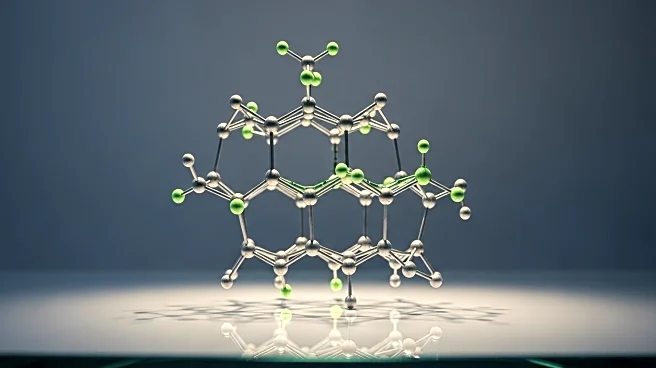What's Happening?
The Nobel Prize in Chemistry has been awarded to Susumu Kitagawa, Richard Robson, and Omar Yaghi for their work on metal-organic frameworks (MOFs). These frameworks are molecular structures with large spaces that allow gases and chemicals to flow through them. The Nobel committee recognized their work as 'molecular architecture,' which has the potential to address significant environmental issues such as carbon dioxide capture and plastic pollution reduction. The scientists began their work independently in the 1970s and 1980s, and their innovations have since been recognized for their potential to tackle some of the planet's biggest challenges.
Why It's Important?
The award underscores the critical role of chemistry in solving global environmental problems. MOFs offer a promising solution for capturing and storing carbon dioxide, a major contributor to climate change. Their ability to break down harmful gases and store chemicals safely could revolutionize waste management and pollution control. The recognition of this work by the Nobel Prize highlights the potential of scientific innovation to create sustainable solutions for environmental protection and resource management.
What's Next?
The next steps involve scaling up the production and application of MOFs. Companies are investigating the feasibility of mass-producing these frameworks for industrial use, particularly in capturing carbon emissions from power plants and factories. The potential to use MOFs in various industries could lead to significant advancements in reducing environmental impact and promoting cleaner technologies. Continued research and collaboration between scientists and industry leaders will be crucial in realizing the full potential of MOFs.
Beyond the Headlines
The development of MOFs represents a shift towards more sustainable and efficient chemical processes. Their ability to be tailored for specific applications makes them a versatile tool in addressing diverse environmental challenges. As the world grapples with the effects of climate change and pollution, innovations like MOFs offer hope for a cleaner and more sustainable future. The ethical considerations of deploying such technologies on a large scale will also need to be addressed to ensure their benefits are maximized while minimizing potential risks.









